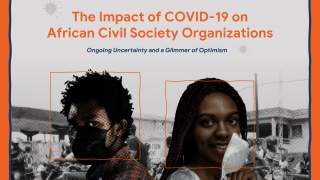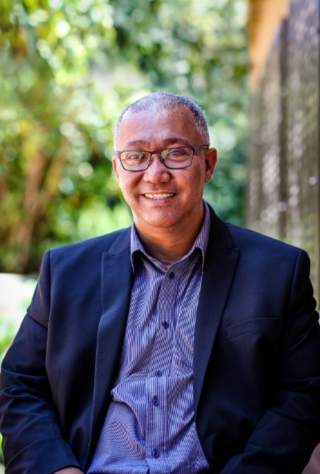African civil society organizations face acute resource shortfalls at a time of increasing demand for their services, reveals new report
Significant losses of funding have limited the ability of African civil society organizations (CSOs) to meet the needs of their communities at a time when COVID-19 has pushed demand for their services to unprecedented levels, according to a report released today by EPIC-Africa and @AfricanNGOs. The report, “The Impact of COVID-19 on African Civil Society Organizations: Ongoing Uncertainty and a Glimmer of Optimism”, is based on a survey of 1,039 CSOs in 46 African countries in June and July of 2021. It follows the groups’ 2020 report, which surveyed African CSOs in the early days of the pandemic.
Despite these challenges, African CSOs have taken on expanded roles during the COVID-19 pandemic, with over 80% of the organizations surveyed introducing new program activities to respond to the social and economic needs of the most vulnerable populations. Yet, CSOs themselves have been hard hit by the pandemic and face considerable uncertainty as the global crisis deepens. Of the organizations surveyed, 68.1% experienced a loss of funding since the start of the pandemic (up from 55% in 2020) and only 8.4% received any funding support from a government emergency relief fund in their country.
This lack of funding, according to the report, has resulted in citizens being denied vital services such as educational programs for children and adolescents, life-saving medication for HIV+ people, shelter for victims of domestic violence, rape and other atrocities, and the muting of citizens’ voices in matters of social and economic justice.
“The findings of this report make it crystal clear that governments and funders must recognize, partner with and support African CSOs, whose actions are critical to driving a comprehensive response to COVID-19,” said EPIC-Africa Co-founder, Rose Maruru. “Since the onset of the pandemic, African CSOs have demonstrated great adaptive ability and creativity in meeting the needs of their communities, and this makes us optimistic that the sector can recover and build a better future.”
Too important to fail
The report notes a marked increase in demand for the services that African CSOs provide: from 31.5% in 2020 to 40.7% 2021. In response to the pandemic, 83.4% introduced new program activities, 27.6% increased their programming to deal with the impact of COVID-19, and 34.3% changed the focus of their programs to COVID-19 from other areas. As the report shows, CSOs are providing these services under strain, with 87.1% reporting increased anxiety and stress levels among staff. The situation is made worse by long-term under-resourcing and restricted civic space in many countries that pre-date the pandemic.
“COVID-19 has laid bare some of the major challenges facing African CSOs,” said David Barnard of @AfricanNGOs, and co-author of the report. “This report is an opportunity to think through the solutions that will ensure a post-pandemic future with resilient and sustainable CSOs. With millions of people depending on the vital advocacy and daily services provided by African CSOs, the sector is simply too important to fail.”
The role of funders
This new report also includes the findings of a complementary survey of funders of African CSOs, which sought to understand how the pandemic impacted their organizations and the implications for their future engagement with African CSOs. The findings show that many funders have demonstrated unprecedented flexibility, provided additional resources, and in some cases, ceded more decision-making power to their grantees. When asked to describe the lessons of COVID-19 and what funders can do to enable CSOs to recover and emerge stronger from the crisis, one funder stressed the importance of general support: “Multi-year flexible grants gave many of our partners the space to react to changing situations. This past year has highlighted the importance of investing in infrastructure; partners benefit from having additional funds to build out their infrastructure so they can remain resilient in changing environments.”
A way forward
According to the report, African CSOs acknowledged that the sector needs to be better organized, collaborate more, and build more robust networks and platforms. The report notes that COVID-19 has ignited an inflection point, and recommends that funders, governments and CSOs carry out initiatives to revitalize the sector, with support for institution-building, including strengthening infrastructure for local philanthropy. It recommends that governments include CSOs in national emergency responses and long-term development efforts, and that CSOs strive to diversify funding and explore new organizational and funding models.
Dr Bheki Moyo, Director for the Centre on African Philanthropy and Social Investment (CAPSI) at the University of the Witwatersrand said: “This report gives us important data and knowledge on the impact of COVID-19 on African CSOs and on how the crisis has exacerbated some of the structural issues that existed pre-pandemic. We have a unique opportunity to think together about how to translate the recommendations from this report into action that benefits the millions of people who depend on African CSOs to weather this and future crises.”
About the report
EPIC-Africa and @AfricanNGOs conducted the survey that informed this report from 1 June to 5 July 2021, with responses from CSOs from all regions of the continent. It is one of the most comprehensive analyses of the impact of COVID-19 on CSOs anywhere in the world. Given the historical challenges facing African CSOs, and the severity of the impact of COVID-19 on the sector, the survey aimed to:
- Capture the ongoing impact of the pandemic on African CSOs, how CSOs are responding, and emerging trends and lessons that may help to predict and prepare for the future.
- Acquire information at the sectoral and regional levels to conduct pertinent cross-sector analyses and present a more granular picture of how African CSOs are coping.
- Compare the findings from the 2020 survey with the current situation, and generate data and knowledge to inform and widen the discussion on building resilience in the African CSO sector.
Building on the survey responses and feedback received from various local and international stakeholders in response to the first report, this report includes two new components:
- Cross-country and cross-sectoral comparisons to surface critical gaps and priorities among CSOs in different parts of the continent.
- Insights from a complementary "mini-survey" of funders of African CSOs on how COVID-19 has impacted them, and how that impact will affect their future engagement with African CSOs.
About EPIC-Africa
EPIC-Africa is a Senegal-based non-profit organization that seeks to strengthen philanthropic impact by filling critical data and capacity gaps in the African civil society sector. It envisages a vibrant civil society ecosystem with diverse, influential, sustainable African civil society groups at the centre. EPIC-Africa contributes to this transformative vision by gathering, analyzing and sharing sector data, as well as providing services and tools that aim to set standards and ensure continuous improvement in performance and impact, champion new approaches, and advocate for better policies to support the sector. Founded in 2017, EPIC-Africa is led by Rose Maruru, with the support of a small in-house team and consultants based in Dakar, Dar-es-Salaam, Johannesburg, Nairobi and New York. EPIC-Africa also works through a vast network of CSOs and peer organizations in Benin, Ghana, Kenya, Nigeria, Senegal, South Africa and Uganda. For more information, please visit https://epic-africa.org.
About @AfricanNGOs
@AfricanNGOs is a Twitter account that covers news and information for and about NGOs in Africa. It is moderated by David Barnard, a development consultant with more than 25 years’ executive and senior management experience in leading and supporting development organizations and programs across Africa. His expertise covers fundraising, strategic communication, stakeholder management, advocacy, governance, ICT4D and philanthropy. David currently acts as a consultant to various NGOs and foundations in Africa, and serves on the Africa Policy Advisory Board of the ONE Campaign. For more information, please visit https://twitter.com/africanngos.
For media requests, interviews with the authors or further questions please contact:
Chakera McIntosh
Communications Lead, EPIC-Africa
+221 77 157 1168 (WhatsApp)
This email address is being protected from spambots. You need JavaScript enabled to view it.
David Barnard
+27 82 870 8968
This email address is being protected from spambots. You need JavaScript enabled to view it.
Santam all tied up in knots | SCA Judgment should prompt insurers to untangle their policy wording
On Thursday, 08 October 2021, short-term insurer, Santam lost an appeal against a decision by the High Court (Western Cape) that it must pay out contingent business interruption claims to Ma-Afrika Hotels and Stellenbosch Kitchen for the full 18-month period covered in their insurance policies.
After Santam argued that its policy wording meant it was only liable to pay out for three months, the Supreme Court of Appeal berated the insurer for its attempts to avoid liability through their series of “twisted and turned” policy arguments.
The judgment is detailed and gives a very good and sensical approach to the purpose of insurance cover; what the reasonable insured would expect; and the difficulties that arise when insurers craft overly complicated policies and insurance schedules.
Insurance Law Expert at Barnard Incorporated Attorneys, George Herbst, stressed that the more complex the construction of the contracts, the greater the chance of internal ambiguity and contradictions. Consequently, the courts are bound to favour the insured and give the benefit of the doubt and confusion to them. “A plain language approach in constructing policies is far favourable and care should be taken to properly vet the contracts and schedules. Product designers and actuaries who craft these documents may understand them, but in the end, the lawyers and members of the public should be able to comprehend them too.”
Important lessons can be taken from this judgment and together with the referenced recent judgments, constitute a massive and valuable evolution of the jurisprudence on the complexity of insurance contracts.
Contact:
GEORGE HERBST | INSURANCE ATTORNEY
Barnard Incorporated Attorneys
This email address is being protected from spambots. You need JavaScript enabled to view it.
Mobile: 072 332 3638
Siyabuya urges taxi peace to enable vaccinations
Cape Town taxi wars are preventing vaccinations against the Covid-19 virus just as infections are rising in the Western Cape.
“We need peace because we need people to get their jabs,” said Siyabuya! leader Melene Rossouw.
“The fact that talks, including with government, have failed once again to produce agreement is devastating. It’s going to affect thousands of people in Cape Town who still cannot get to vaccination sites. This is tragic, particularly for older people who are most vulnerable to the virus.
“I know of people who cannot move from their homes because all forms of transport have come to a halt as a result of the taxi violence. This is directly affecting jobs and livelihoods, as well as vaccinations which are critical to both.
“Taxi drivers were heroes in the recent unrest in Gauteng and KwaZulu-Natal, helping to protect shops from looters. But in Cape Town they are killing each other over routes and harming the city’s economy by stopping people getting to work, shops and vaccination sites.
“Cape Town needs a rethink. Please people – lives are at stake and the virus is spreading. Without taxi peace, Cape Town cannot fight this virus,” she said.
Siyabuya is a voluntary movement formed to link people and groups who believe South Africa can emerge stronger from the coronavirus pandemic. It promotes moves to keep safe, feed others and get vaccinated as soon as people are eligible.
“Siyabuya believes that, by working together, we can #MakeSAbetter. We need taxi peace if that is going to happen in Cape Town,” Melene said.
-- ENDS --
About Melene Rossouw
Melene Rossouw is the external leader of Siyabuya. She is an internationally recognised gender and human rights activist, global award winner, public speaker, moderator, facilitator, strategist and consultant. An attorney with 13 years’ experience, Melene is founder of the Women Lead Movement in South Africa.
Her accolades include being selected by the prestigious Obama Foundation as an Obama Leader in Africa (2018) and as a Mandela Washington Fellow by the US Department of State in 2019. In October 2020, she was selected as one of the 100 Most Influential Young Africans and made the Top Ten list of Most Influential Young Africans by Africa Youth Awards. She was also recently named as one of the 100 Most Influential South Africans.
About Siyabuya
Siyabuya believes South Africa can emerge stronger from the Covid-19 pandemic. It aims to build networks across the country of people who share this belief and are working to achieve it. Those who are helping others, creating jobs and feeding the poor, are setting examples others can emulate.
Siyabuya! aims to #MakeSAbetter by instilling a common sense of mission, built from the ground up, through ordinary South Africans engaged in active citizenry to improve their fortunes and the lives of those around them.
For more information, visit our website at www.siyabuya.org.za
Priority vaccination plea to save lives
Risk of death rather than mortality rates should be the criteria that secures priority vaccination argues the QuadPara Association of South Africa (QASA). The organisation has made a plea to the Department of Health to include quadriplegics and paraplegics in the second round of the vaccine roll out. The organisations hopes this will prevent deaths among its members and ensure no one is left behind.
“Many quadriplegics and paraplegics are at a higher risk of contracting the COVID-19 virus,” explains Raven Benny, QASA COO. “By pushing their wheelchairs, catheterising or accepting assistance from their carer, they are placed in high-risk situations.
“For most, social distancing from their caregiver, family or friends are impossible as they need assistance with daily, essential activities. A vaccination might not prevent them from contracting the Coronavirus, but it can prevent a visit to the hospital.”
Many quadriplegics and paraplegics are at an increased risk of falling severely ill and hospitalisation when contracting COVID-19. Due to lifestyle factors, like a sedentary routine, many in the community have co-morbidities like diabetes or high blood pressure. In addition, pressure sores (an open wound) and urinary tract infections are common and put strain on an already compromised immune system.
Aside from the impact on limbs, a spinal cord injury plays havoc on the immune systems and nervous systems of quadriplegics and paraplegics. The immune system is slowed, which gives the virus more opportunity to spread.
“We want to keep our members out of hospital as we are very much aware that, unfortunately, they are not always considered a priority,” Benny continues. “In times of disaster, doctors will do what is best for the most, which might mean denying a high-risk patient access to a ventilator to help others.
“We respect the medical practices that prioritise saving as many people as possible. Instead, we are calling on the Department of Health to save lives. They have the resources to make sure our members are never placed in a situation where a doctor needs to decide between saving them and another with a strong immune system. We need to be vaccinated.”
QASA wrote to the Department twice. After the first letter, the Department enquired about the mortality rate among members. Aside from the limited information available regarding deaths, QASA argues that there is sufficient reasons to vaccinate the community.
“Are we going to be denied because there haven’t been enough deaths? How many should die before we are considered vulnerable? We call on the Department of Health to put risk of death as the highest priority rather than existing mortality rates,” says Benny.
“Afterall, are they in the business of saving lives or counting corpses?” he concludes.
-- ENDS --
Notes for the Editor:
For more questions, concerns or comments:
Raven Benny, QASA COO
This email address is being protected from spambots. You need JavaScript enabled to view it.
031 767 0352
Mariska Morris, Communications officer
This email address is being protected from spambots. You need JavaScript enabled to view it. OR This email address is being protected from spambots. You need JavaScript enabled to view it.
084 788 8399
Read more on the vulnerability of quadriplegics and paraplegics:
Christopher & Dana Reeve Foundation, 2021. Christopher & Dana Reeve Foundation. [Online] Available at: https://www.christopherreeve.org/living-with-paralysis/health/secondary-conditions/covid-19-and-spinal-cord-injury[Accessed 21 April 2021].
Calvo, E. et al., 2020. Why Does COVID-19 Affect Patients with Spinal Cord Injury Milder? A Case-Control Study: Results from Two Observational Cohorts. Journal of Personalized Medicine, 10(182).Louw, G., 2020.
Choice. A matter of ethics.. Rolling Inspiration, Issue 3, pp. 24-26.Stillman, M. D. et al., 2020.
COVID-19 and spinal cord injury and disease: results of an international survey. Spinal Cord Series and Cases, 6(21).





